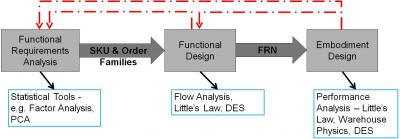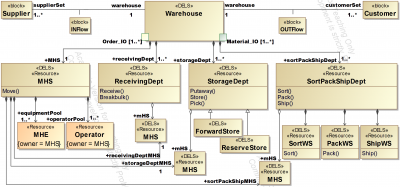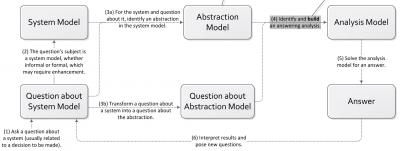"Discrete event logistics system" (DELS) is a phrase used to identify a large class of systems which all share the following characteristics—products flow through and are transformed by a network of processes, which are executed by resources, arranged in a facility.
DELS are a staple of IE/OR/MS teaching and research. DELS problems often are used to motivate methodology courses like optimization, simulation, and queuing theory. There are specifically DELS-focused courses on warehousing, manufacturing systems, supply chains, etc. There is a vast research literature on modeling and analysis of specific DELS, and solution methodologies specialized to particular DELS.
And yet, there are "grand challenges" in the DELS domain:
- to consolidate and unify what is known already about DELS so that it can be taught and learned more efficiently, and deployed more effectively
- to automate all analyses that we already know how to do (think of route finding using Google maps)
- to develop a comprehensive DELS design theory, and demonstrate corresponding design decision support tool chains.
These grand challenges motivate the Keck VFL research agenda:
-
How can we create explicit but analysis-agnostic representations of the DELS of interest that is adequate to serve as the "single source of truth" for the development of all related decision support analyses? This work is fundamentally about discovering a universal semantics and syntax for describing systems in the DELS domain and identifying and articulating common patterns of use for system specification. Our work in this area can be categorized as addressing:
- the generic DELS domain, where we seek to understand what is common to all DELS instances. In order to have a truly useful semantics and syntax, we will typically need to consider specialized subdomains, each of which has its own unique semantics.
- the subdomain of manufacturing DELS, with its specialized terminology and unique decisions
- the subdomain of warehousing DELS, with its specialized terminology and unique decisions
- the subdomain of supply chain DELS, with its specialized terminology and unique decisions
This research uses state-of-the-art system modeling languages and methods, and makes a very clear distinction between the modeling of the system of interest and the modeling of the analysis of the system of interest.
-
How can we automate the creation of OR models that are used to support decision making in DELS? This area of research yields some generic approaches, but the implementation invariably focuses on a particular sub-domain, e.g., manufacturing, warehousing, supply chains, etc. This research draws from contemporary computer science, and constitutes the bridge from system descriptive models to system analysis models. It requires deep knowledge of both.
-
How can we create useful tool chains to support the design of DELS? This research exploits available commercial-off-the-shelf (COTS) and open source tools where possible and appropriate, but also involves object-oriented software implementations where necessary.
Keck VFL research is funded from a mix of private (industry) funding, philanthropy, and federal funding, and provides support for graduate students (both MS and PhD) and post-doctoral fellows.


